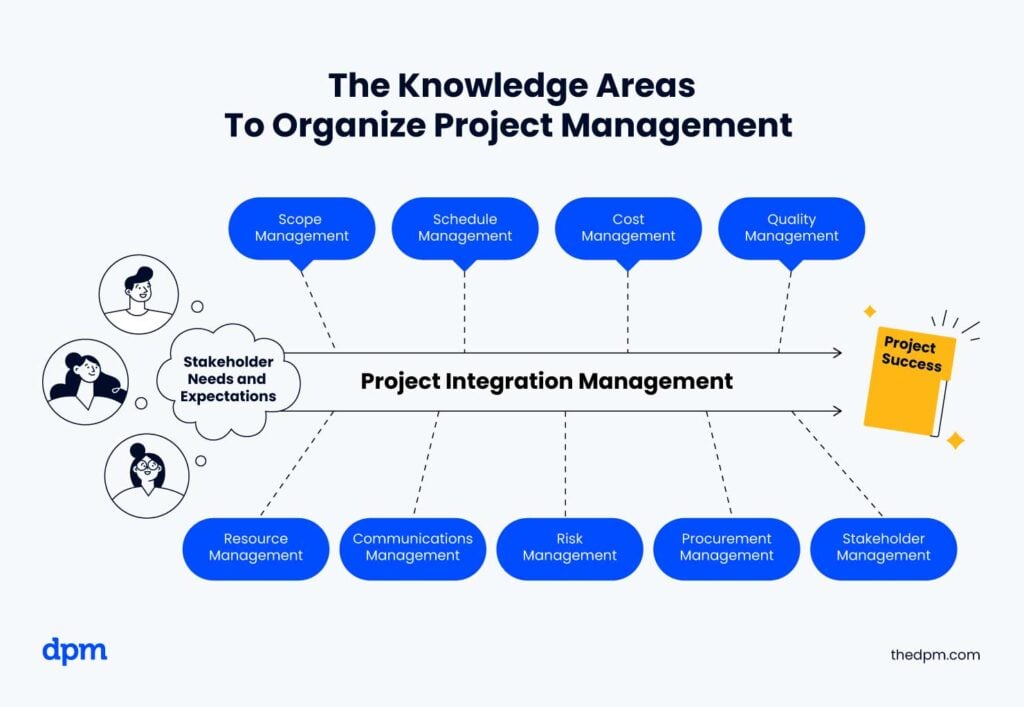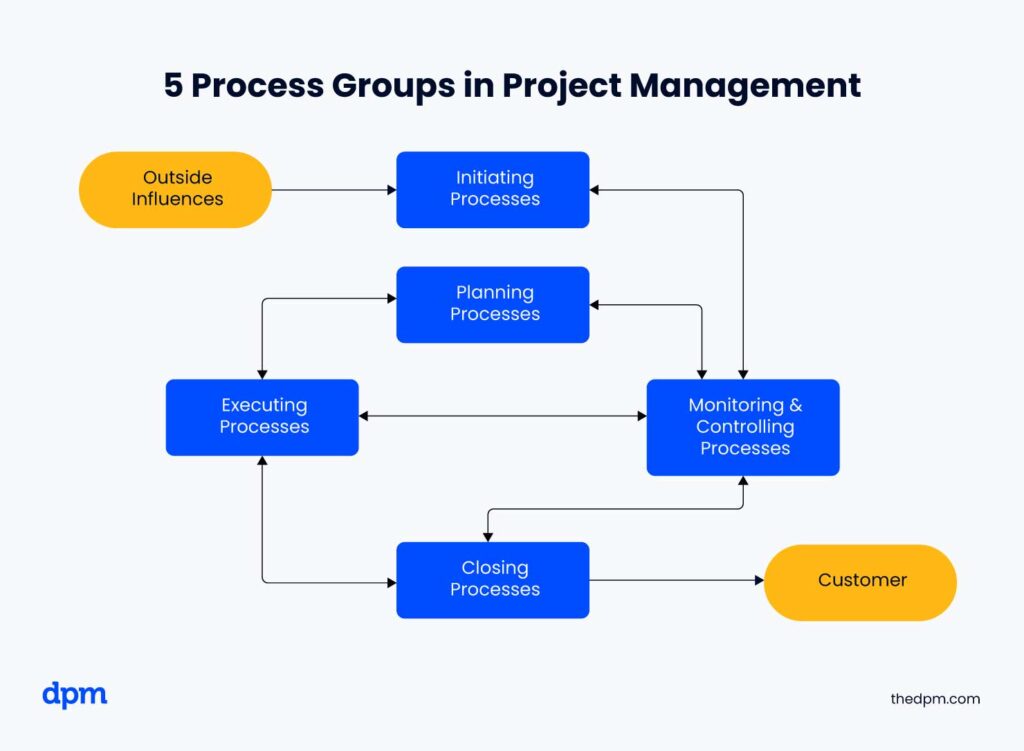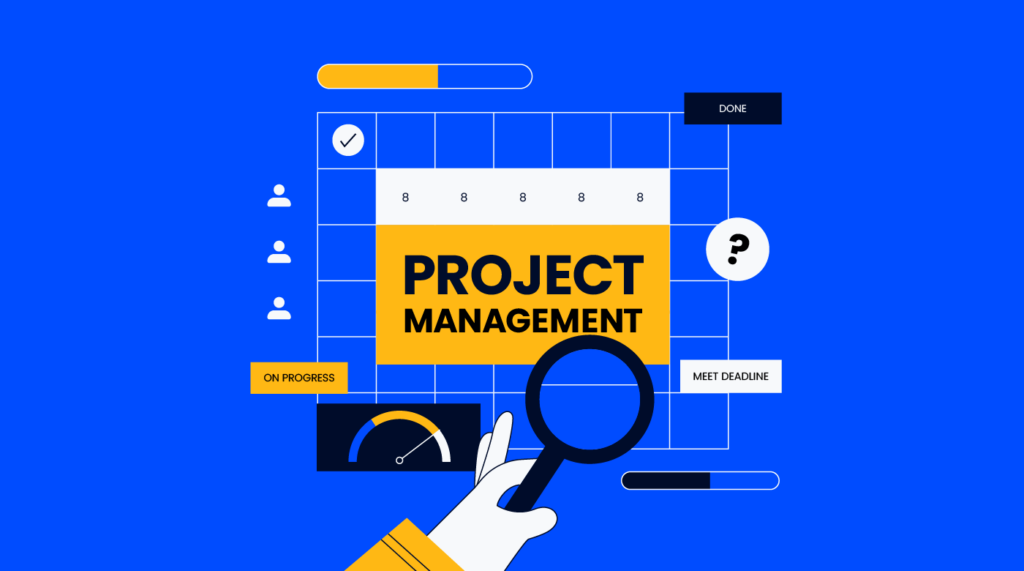The project management knowledge areas are a concept from the Project Management Institute (PMI) that outlines 10 major areas of concern that project managers need to pay attention to during their projects.
They provide a framework that allows project managers to have complete oversight on a project (and a framework throughout which aspiring project managers can study for the Project Management Professional (PMP) certification offered by PMI).
What Are The 10 Knowledge Areas In Project Management?
The 10 project management knowledge areas are the core aspects of running a project, as described in the Project Management Body of Knowledge (PMBOK) 6th edition from PMI. They organize project management processes by what needs to be done to manage the project successfully, and provide frameworks so project managers can plan, manage, and finalize projects.

Here are the 10 knowledge areas:
| Knowledge Area | Purpose |
|---|---|
| Project Integration Management | Coordinate work to make sure that all aspects of the project come together at the right time to accomplish the project objectives. |
| Project Scope Management | Define project objectives, establish a scope baseline and monitor and control the project to meet the scope baseline. |
| Project Schedule Management | Determine a realistic schedule baseline and monitor and control the project to meet this baseline. This is often alternately referred to as project time management. |
| Project Cost Management | Estimate costs, establish a realistic project budget and cost baseline, and control costs so the project is completed within the approved budget. |
| Project Quality Management | Determine project quality requirements and ensure that project will meet these requirements. |
| Project Resources Management | Ensure necessary equipment, material, and facilities are available in a timely fashion, assign the right people to work on the project, and organize them to create a high-performance team. |
| Project Communications Management | Ensure timely and appropriate generation, collection, dissemination, storage of project information to all stakeholders. |
| Project Risk Management | Identify risks, analyze risks, and monitor risks. Plan risk responses and prepare to handle individual risks and project uncertainty. |
| Project Procurement Management | Plan, manage and control the acquisition of goods and services from outside the performing organization. |
| Project Stakeholder Management | Ensure thorough identification of all stakeholders and conduct effective stakeholder engagement throughout the overall project. |
The 10 knowledge areas include processes for tracking and managing project scope, schedule, and cost, and other constraints such as quality, resources, and risk.
The processes in the areas of communications, stakeholders, and procurement give detailed instructions on how to plan and communicate with all stakeholders and secure goods and services from outside the organization.
The integration knowledge area is the finishing touch: it brings everything together into a seamless whole and serves up the finished meal.
What are the 5 Process Groups in Project Management?
The project management process groups define and organize project management processes by when they need to happen.
This helps with project sequences and timelines so project management activities occur at the right time.

| Process Group | Purpose and Definition |
|---|---|
| Initiating Processes | Define and authorize a project or a new phase of an existing project. Create a project charter. |
| Planning Processes | Establish scope, refine objectives, and plan a course of action required to deliver the scope the project needs to achieve. Create a communication plan and work breakdown structure (WBS). |
| Executing Processes | Coordinate people and resources and develop the team to complete the work defined in the project management plan that satisfies the project requirements. |
| Monitoring & Controlling Processes | Track, review and regulate the progress and performance of the project, identify required changes, and initiate these changes. |
| Closing Processes | Formalize acceptance of the product, services, or result and bring the project or a project phase to an orderly close. |
Why are the Knowledge Areas Of Project Management Important?
The PMBOK knowledge areas assist project managers with categorizing and organizing the various project components, and then creating a systematic approach to project execution.
They help organize and coordinate all aspects of the event, ensuring its success by preventing any important details from being overlooked.
How Are Knowledge Areas Used In Real-Life Projects?
Let’s take the example of a dental convention, a large-scale project with thousands of attendees. Each knowledge area plays a crucial role in ensuring the success of the convention.
- First, the scope management knowledge area is used to create a comprehensive scope statement so we understand exactly what type of event we are creating.
- Next, the cost management knowledge area determines the total budget for the event.
- The quality management knowledge area assists in creating a quality plan.
- The resource management knowledge area helps determine the number of staff needed to host the convention
- The communication knowledge area is used to craft effective marketing communication to attendees.
- Additionally, the procurement knowledge area is used to secure contracts for the venue, suppliers, and vendors.
Updates To Knowledge Areas & Process Groups In The PMBOK 7th Edition
Instead of being based on a detailed project management process framework, the 7th edition presents foundational principles and domains, collections of essential activities, that experienced project managers in all types of project environments can use to lead a successful project.
The 7th edition is designed to help project managers be more proactive, innovative, and nimble with today’s fast paced projects to create customer satisfaction.
What are the 12 Principles in the PMBOK 7th Edition?
The 12 principles in the 7th edition guide the behavior of people involved in projects, no matter how big or small. These principles provide a foundation for all project activities regardless of what you are doing or where you are in the project life cycle.
| Project Management Principle | Summary |
|---|---|
| Stewardship | Demonstrate integrity, care, trustworthiness, and compliance with internal and external guidelines including financial, social, technical, and environmental sustainability. |
| Team | Create collaborative teams composed of individuals with diverse skills, knowledge, and experience to accomplish shared objectives. |
| Stakeholders | Engage proactively with stakeholders throughout the project life cycle to create project success and customer satisfaction. |
| Value | Continually evaluate and adjust projects to align with business objectives and create the intended benefits and value. |
| Systems Thinking | Take a holistic view of how all parts of the project interact with each other and with external systems to positively affect project performance. |
| Leadership | Adapt leadership behaviors to support individual, and team needs and ultimately lead to project success and positive project outcomes |
| Tailoring | Continuously adapt the approach based on the context of the project, its objectives, stakeholders, governance, and the appropriate level of formality for the organization. |
| Quality | Maintain a consistent focus on producing quality deliverables that meet the project objectives and align to the needs, uses, and requirements of relevant stakeholders |
| Complexity | Stay vigilant in identifying complexity resulting from human behavior, system interactions, uncertainty, and ambiguity and use a variety of methodologies to reduce the impact |
| Risk | Conduct both a qualitative risk analysis and quantitative risk analysis, and continuously evaluate project exposure to risk, both opportunities and threats, to maximize positive impacts and minimize negative impacts to the project and its outcomes. |
| Adaptability & Resiliency | Build organizational and project team’s approaches to help the project accommodate change, recover from setbacks, and advance work of the project. |
| Change | Help stakeholders adopt and sustain new and different behaviors and processes as needed to transition from current state to the intended future state created by the project outcomes. |
What are the PMBOK 7th Edition Project Performance Domains?
A project performance domain is a group of related activities that are critical for the effective delivery of project outcomes. The 7th edition defines eight interdependent project performance domains that work in unison to achieve the desired project outcomes.
| Performance Domain | Summary |
|---|---|
| Stakeholders | Work with all stakeholders to maintain alignment and engage them to foster positive relationships and satisfaction. |
| Team | Create shared ownership, high performing teams, and foster leadership and interpersonal skills for all team members. |
| Development Approach & Life Cycle | Determine appropriate development approach, delivery cadence, and life cycle phases for the project. |
| Planning | Create and maintain a roadmap to ensure that the project progresses in an organized, coordinated, and deliberate manner to accomplish the project deliverables and outcomes. |
| Project Work | Ensure effective project performance to accomplish objectives, conduct stakeholder communication, manage procurements, manage physical resources, and foster a learning environment. |
| Delivery | Deliver complete scope and quality results that accomplish the intended outcomes and create benefits that contribute to business objectives and advancement of strategy. |
| Measurement | Assess project performance and take appropriate actions to keep performance on track to meet stakeholder expectations. |
| Uncertainty | Identify and be prepared to handle uncertainty, ambiguity, complexity, and volatility. |
These performance domains replace the 6th edition project management framework organized by process groups and knowledge areas. Both views cover all aspects of managing a project, however with a different emphasis.
The 7th edition performance domains emphasize performance in all domains with the goal of delivering value. The 6th edition process framework focuses on doing the right processes in the correct order.
How Does The Framework Influence The Principles And Domains?
We can use the example of running our dental convention to demonstrate how the 7th edition principles and performance domains apply to projects.
- We apply the principle of stewardship to ensure the vendors we hire for the convention follow local guidelines and regulations.
- The performance domain describes activities that we will use to deliver a successful convention.
- We use the activities in the stakeholder domain to proactively identify the needs and expectations of all convention attendees, and we do our best to make sure these needs and expectations are met.
- We use the activities described in the planning and project work domains to plan and execute the convention.
- During and after the convention, we use the activities in the measurement and delivery domains to make sure the convention delivers the intended business value.
What's Next?
To learn more about how projects are managed through the project life cycle and which methodologies are processes are used to run projects, take our Mastering Digital Project Management course.


